Description
George Orwell’s Animal Farm (bilingual) indirectly refers to the conditions of the former Soviet Union during World War II.
“Animal Farm”, also known as “Animal Castle” in Iran, along with the novel “1984” are two enduring and significant works of “George Orwell”, English writer and journalist, which is known as the best-selling works of this author of the twentieth century. Is. The book Animal Farm was not licensed due to good British-Soviet relations at the time, but was finally published in England in 1945 and became famous in the late 1950s.
In both of these works, published in the last years of his life, Orwell depicts a ruined city with all its negative features, a picture of a horrifying reality that serves as a warning to humanity, and sooner or later if human catastrophes continue. It becomes the truth.
As a social democrat during the Spanish Civil War, George Orwell, acquainted with the policies of the Soviet Socialist government and outraged by the violent purges of Joseph Stalin’s so-called “Great Purges”, wrote the novel Animal Castle. He strongly criticized the tyranny of the Soviet ruling class, believing that the Soviet system had become a dictatorship. In the book Animal Castle, the farm animal revolution is a symbol of the workers’ revolution and its fate against the capitalist system.
In his work, George Orwell uses all the tools and elements of science-fiction, but in fact his writings are more than anything propaganda: propaganda against communism and the Stalinist regime, and basically any regime. Authoritarian. Although he bases his works on his political beliefs, he is not unaware of their artistic aspects. He considered novelism to be a moral world, and it was for this reason that he found his political path in revolting against the atrocities and cruelty of the supporters of Franco and Stalin.
Excerpt from Animal Farm (bilingual)
In April, the Republic was declared an animal farm. They needed a president, and of course no one but Napoleon deserved to be nominated, so he was elected by popular vote.
On the same day of the election, it was rumored that new documents had been received about Snowball’s collaboration with Jones, and it became clear that Snowball not only wanted to lose the Cattle War, but that he was cunningly fighting for Jones, and in fact it was Snowball who killed people. He fought for the war and entered the war chanting “Long live humanity”; The wounds on his back, which some animals remember, have also replaced Napoleon’s teeth.
In the middle of the summer, bananas, the domestic crow, were found again in the Animal Castle after years of disappearance. He had not changed at all; He did not work as usual and talked about old topics like the chocolate mountain and other things. He sat for hours on a tree trunk, fluttering his black wings and talking to anyone who listened to him for a long time. Bananas pointed to the sky with their beaks and said:
Friends, right up there, behind the black clouds, there is a land of chocolate, and this is the land that frees us poor animals from the pain of working …
George Orwell was born in 1903 in India. His real name was Eric Blair and his father was a government employee in Bengal. He returned to England with his family as a child, and although his family was not well off; But he was enrolled in one of the most prestigious private schools in Eton. So at that time he grew up as a poor boy in a highly class British society.
In 1922 he joined the police force in Burma. There he studied a lot and learned many facts about Burma, and when he realized that Britain had conquered and colonized Burma against his will, he was very ashamed of his role in that country. He quit his job and decided never to return.
George Orwell later decided to live a life of poverty, so he spent some time in London and Paris among the poor, the homeless, the unemployed, and the seasonal workers. When he had no money, he worked as a dishwasher in a hotel. He also began writing about his experiences at this time.
When he returned to London, he continued writing. His first book was published under the pseudonym George Orwell; Because he did not consider his name worthy of honor. Worked as a teacher for a while; However, his poor health caused him to quit the job. He worked in a bookstore for a while. In 1936 he married Eileen Ashnagsey and left London, settling in Hertfordshire and working in a local store.
When the Spanish War broke out, Orwell felt he had to travel there. He intended to examine the situation there and to record the events of the war; But when he entered the country, he got involved in the war and came out in support of the Republicans; But after a while, he was injured and fled to France with his wife.
In 1938 he became seriously ill; So that when World War I started, he could not join the army. Instead, he worked as a reporter. His wife died in 1944 during an operation. By this time Orwell had become a successful and famous writer;
But his health was in danger and he spent his last year in hospital. He married Sonia Brunwell in 1949, and they decided to travel to Switzerland; But George died in 1950.
Many of Orwell’s works have been written based on his own personal experiences. The novel The Days of Burma is based on his experience and life in Burma and his service in the police force, as well as the aces and passes of Paris and London based on his experiences of living with poor people in these two European cities.
The book Long Live Catalonia was also written during the Spanish Civil War. Memories of teaching at school are reflected in the priest’s novel, and the book Money Is Everywhere describes her life as a bookseller. A road to Wigan Harbor is a biography of him during his unemployment in the industrial areas of the north of England.
But George Orwell became famous for his two books. 1984 is a wonderful book that describes the world of the future, in which people’s lives and even their thoughts are controlled. A world from which love and truth are rejected and people are deprived of private life.
The book Animal Farm, or Animal Castle, is ostensibly a story about animals.
The story is about a failed insurgency based on the Russian Revolution and Joseph Stalin’s abuse of power. The general message of the book is that man’s desire for power prevents the formation of a classless society. Each of the animals in this story represents a particular type or class of society.
Pigs are the Bolsheviks whose job it is to read, write, and organize other animals. Napoleon is Stalin, and Snowball plays Trotsky. The boxer, the toiling horse, represents the working class.
Initially, a group of farm animals abused by the farm owner revolted and passed laws to establish a society based on equality; But gradually these laws are violated and ….
Chapter One Animal Farm (Bilingual)
At night, Mr. Jones, the owner of Manner Farm, locked the chicken coop door; But he was so drunk that he forgot to close the hole above it. Stumbling along with the ring of light of his lantern, which swings the dancers to and fro, he walked across the courtyard, took off his shoes behind the front door, and filled the last glass of beer from the barrel in the kitchen. He got up and went to bed, sleeping next to Mrs. Jones, who was snoring.
As soon as their bedroom lights went out, there was a commotion all over the farm. During the day, word spread everywhere that the night before, Major Pierre, the winner of the Animal Exhibition Award, had had a strange dream and wanted it for the animal.
Mr. Jones went to his bedroom and rested everywhere, all gathered in a large stable. Old Major (he was always called by the same name, although he had exhibited at the Wellington Beauty Fair) was so respected on the farm that everyone was willing to wake up for an hour to hear him speak.
The old Major was crouched on a high platform, on a bed of straw, under a lantern hanging from a pole in the corner of a large stable. He was twelve years old, and had recently become a little fat and thick, and although his two canines had never been extracted; But the pig was still wise, benevolent, and majestic. In short, it did not take long for the other animals to arrive, each with its own taste in a corner.
First of all, dogs; That is, Bluebell, Jesse, and Pincher came, and then the pigs’ heads were found, and right there in front of the platform, they lay on the straw. The chickens sat on the ledge of the window, the pigeons with the females’ wings rested on the roof beams, the sheep and cows licked behind the pigs, and at the same time began to chew. The two cart horses, Boxer and Clover, entered the barn together slowly.
They walked cautiously, fearing that they might kick the smaller animals hiding under the straw. Clover was a middle-aged, fat mare who had never regained her original body shape after giving birth to her fourth globe. The boxer was a large animal about eighteen inches tall and about the size of two normal horses. The white line on his snout had given him a silly appearance, and in fact, although he was not a first-rate genius; But everyone respected him for his dignified personality and extraordinary work ethic. They were followed by Muriel, the white goat, and Benjamin, the gray donkey.
Benjamin was the oldest and most mischievous farm animal. He seldom opened his mouth, and when he did speak, he was usually bitter. For example, he would say, “God gave me a tail to ward off those insects,” and he would immediately add, “But I wish I had neither a tail nor an insect!” He was the only farm animal you never laughed at.
If anyone asked why, he would say, “I do not see anything to laugh about. However, he had a special devotion to the boxer without openly showing his desire. They usually went to the small meadow behind the orchard on Sundays and grazed together without talking to each other.
As soon as the horses licked in the corner, a group of ducklings that had lost their mother, the crickets entered the stable and wandered from side to side, looking for a place to avoid being trampled underfoot. Clover made a narrow mum for them with her front legs, and the ducklings nested there and soon fell asleep …
Written during World War II and indirectly referring to the situation in the former Soviet Union, the novel was not licensed due to good British-Soviet relations at the time, but was finally published in England in 1945 and later The 1950s became famous.
Mr. Jones’s farm animals in a revolutionary move oust him from the farm and take control of it themselves to provide equality, welfare and comfort for the farm animals. The movement is led by a group of pigs, but it does not take long for them, led by a pig named “Napoleon”, to start exploiting other animals and new problems arise.
Orwell wrote a critique of the tyranny of the Soviet ruling class in Animal Castle. He believed that the Soviet system had become a dictatorship. In this novel, the revolution of farm animals is a symbol of the workers’ revolution against the capitalist system and its destiny.
George Orwell, who was acquainted with the policies of the Soviet socialist government during the Spanish Civil War and was outraged by the violent purges of Stalin’s time, harshly criticized the authoritarianism of the Soviet ruling class. In this novel, the farm animal revolution is a symbol of the workers’ revolution against the capitalist system.
The first part of the book Animal Castle (Animal Farm)
Mr. Jones, the owner of Manner Farm, was so drunk that when he locked the chicken coop at night, he forgot to close the top hole. Stuttering around with his swinging lantern, the dancer walked across the yard, tossing his shoe behind the door, filling his last glass of beer from the barrel, and falling to the bedroom where Mrs. Jones was snoring. Went.
As soon as the bedroom lights went out, there was a commotion on the farm. It was rumored that Major Pierre, a Pig Award-winning male pig, had a strange dream last night and wanted to pass it on to the other animals. To gather. The old Major (he was always called by this name, although he had exhibited under the beautiful name of Willingden) was so respected on the farm that everyone was willing to devote an hour of their sleep to listening to him.
1- Introducing the book on YouTube
2- Introducing the book in Aparat

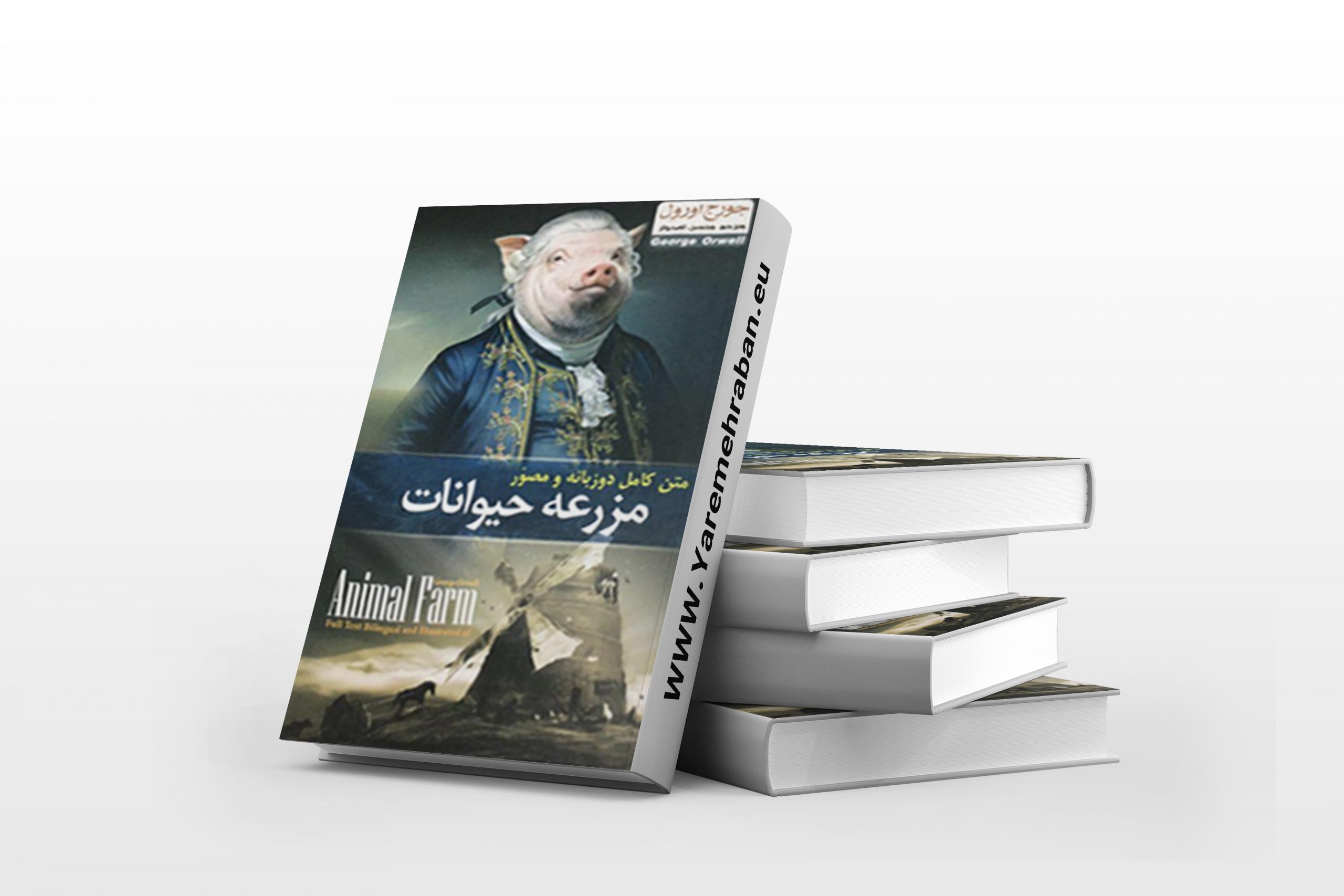


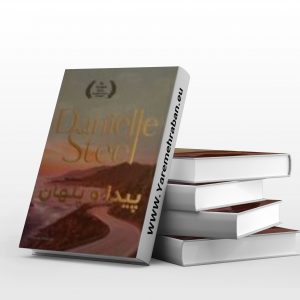
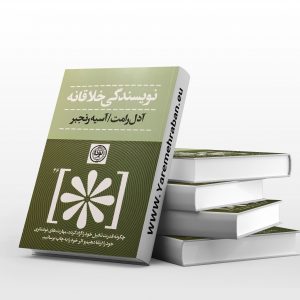


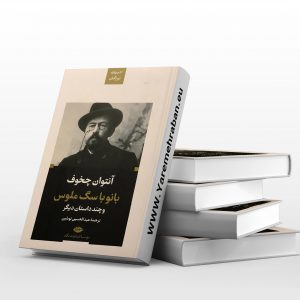
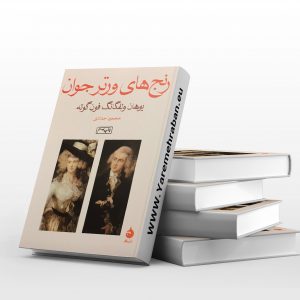




Reviews
There are no reviews yet.